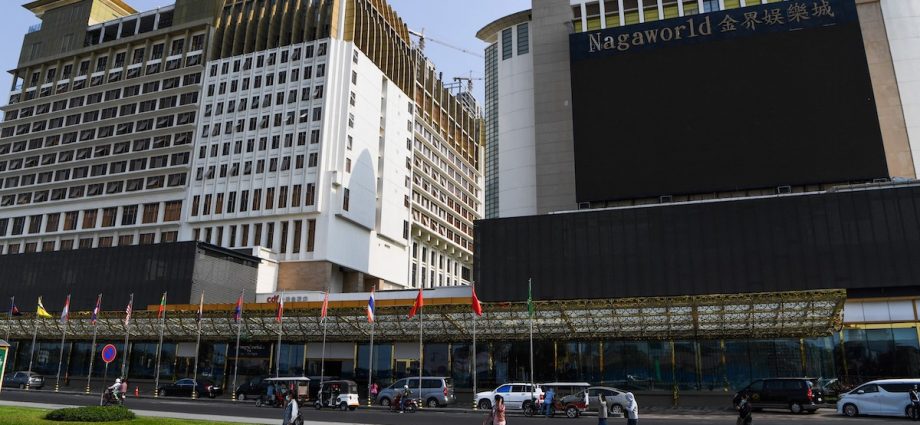
The inability of the Cambodian government to enforce law and order within the country’s borders is turning the country into the preferred base for criminal Chinese gangs running modern slavery rings.
Tens of thousands of people from countries across Asia and from as far away as Ukraine are being held against their will in Cambodia and forced to operate cyber scams, according to the Global Initiative Against Transnational Organized Crime.
Cambodians have long been vulnerable to being exploited in conditions of modern slavery when they move to countries such as Thailand in an attempt to make a living. The emergence of Chinese-run international slavery in Cambodia is more recent. The crackdown on online gambling in China has led the country’s criminal elements to seek soft alternative regional bases. Cambodia, Myanmar and Laos are top of the list.
A simple message should be repeated as often and as widely as possible: If you are being offered a high-paid online job in Cambodia on an app such as WeChat, QQ, WhatsApp or Telegram and you have never heard of the company offering it, then there is a good chance that this is a highly dangerous scam.
The usual pattern is for the victims to be told when they arrive that they have run up large debts in relocation costs and that they must work to pay off these debts. The victims are therefore forced to work for as long as is needed to trick people online into making fake investments in cryptocurrencies or gold.
Al Jazeera has reported that these scamming centers are found in casinos, hotels, residential developments and office complexes. They have bars on the windows and barbed-wire fences, making escape difficult.
The scamming targets are impossible for the victims to meet. Some have succeeded in breaking out, while most are forced to keep working through beatings, electrocution and threats of starvation. A recent case saw a mass breakout by more than 40 Vietnamese held in a Cambodian casino who jumped into a river to try to escape. One teenager was swept away and died.
Neighboring governments know that it is pointless to wait for Cambodia to act. In April, Thailand sent its own police to try to find enslaved workers in Phnom Penh and Sihanoukville. They rescued 68, though they had aimed to save up 3,000 Thai nationals.
‘Endemic corruption’
In July, the US Department of State relegated Cambodia to the bottom tier of its human-trafficking index. Cambodia, the report said, does not meet minimum standards for the elimination of trafficking and “is not making significant efforts to do so.” The report finds that “endemic corruption continued to impede overall law-enforcement operations, holding traffickers accountable, and victim service provision.”
Priority actions for Cambodia, the report says, include unannounced labor inspections in high-vulnerability areas such as brick kilns, entertainment venues, construction sites and plantations, with the aim of identifying debt bondage.
There is little chance of that happening. The chances of getting caught as a slave master in Cambodia are slight and, even in a worst-case scenario, bribery offers a ready way out of legal problems.
According to Bertelsmann Stiftung’s Transformation Index for 2022 (BTI), law enforcement and implementation in Cambodia are “very limited.” Because the judiciary is under political control, justice is “generally denied to the majority or is exclusively for those who are able to bribe judges,” BTI says.
The government response to these issues follows a pattern of bluster, denial and refusal to confront the facts which is typical of Prime Minister Hun Sen’s regime. The US decision was an “injustice” said Chou Bun Eng, vice-chairman of the national counter-trafficking committee.
NagaWorld
The cyber slavery phenomenon is part of the process of the outsourcing of Chinese social problems to Asia’s weakest and most corrupt destinations. Most of Cambodia’s 150 casinos are Chinese-owned. Cambodians get little benefit from the casinos, where Chinese have the best jobs and the best pay.
Prime Minister Hun Sen issued a ban on online gambling in August 2019. This was mainly for political consumption. The gambling industry remains a major source of funding for Hun Sen’s family and there are still many Chinese online gambling businesses in Cambodia.
News of the crackdown has mainly concerned Phnom Penh and Sihanoukville. The online gambling industry continues to flourish in places that are less well known to the outside world, such as Dara Sakor in Koh Kong, the MDS Thmor Da Special Economic Zone in Pursat, Chrey Thum in Kandal and Osmach in Oddar Meanchey. Police have arrested some low-level employees, but none of the bosses.
The largest casino, NagaWorld in Phnom Penh, is owned by Chinese-Malaysian businessman Chen Lip Keong. Since December 2021, Cambodian staff have been on strike against NagaWorld layoffs.
When Vitit Muntarbhorn, the UN special rapporteur on human rights in Cambodia, visited in August, the authorities allowed protests in front of the casino for two days. The rest of the time, the peaceful protesters have been arrested and/or beaten up, with civil-society representatives and United Nations human-rights officials prevented from monitoring the protests.
Governments in the region should realize that Cambodia under the current regime is not a good-faith partner in the fight against cyber slavery. The government is complicit in the problem and won’t be a part of the solution. Countries need to step up their efforts at preventive education and direct rescue when necessary.
Cambodia will only be able to make a meaningful contribution once the culture of corruption in the police and judiciary has been uprooted by thorough reform.

